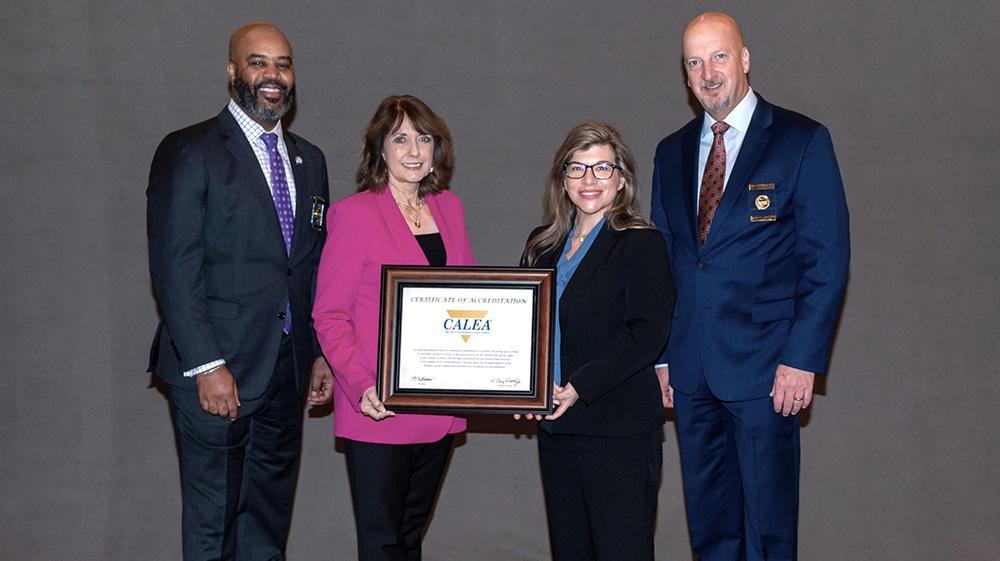Program News
College Maintains National Accreditation for Public Safety Training

RALEIGH, N.C. (November 11, 2023) – The Wake Technical Community College Public Safety Training Academy was awarded national accreditation by the Commission on Accreditation for Law Enforcement Agencies Inc. (CALEA®) in the Training Academy program. The academy, located at the college's Public Safety Education Campus, was first accredited in 2012.
Following a multi-year self-assessment phase and a meticulous site-based assessment of community engagement, policy, procedures, equipment and facilities by CALEA® assessors, Wake Tech's Dr. Jamie Wicker and certified CALEA® Accreditation Manager Tami Warren attended the CALEA® conference in Bellevue, Wash. Each agency being reviewed goes before CALEA's 21-member Board of Commissioners, where the commission reviews all findings and determines the agency's accreditation status.
The evening of the hearing, during the celebration banquet, CALEA® Commissioner Marlon Lynch and Executive Director Craig Hartley awarded Wake Tech's Public Safety Training Academy with accreditation, signifying excellence in public safety and commitment to community. This is Wake Tech's fourth award of national accreditation. The agency now moves into its next CALEA® four-year accreditation cycle that includes four annual remote, web-based file reviews and a site-based assessment in the fourth year.
"We are honored to have received our fourth CALEA® accreditation award," said Wicker, provost and chief campus officer for the Public Safety Education Campus. "It is a testament to the collective efforts of our Public Safety Education and Training team and Wake Tech's commitment to public safety training.
"While this accreditation requires us to rigorously comply with 160 standards, we voluntarily do so because we value the opportunity for self-reflection and continuous improvement," she continued. "Many of our partner agencies and stakeholders are also accredited, and we want them to know that we stand with them in our collective commitment to excellence for the delivery of public safety programming.
"I especially appreciate that the CALEA® accreditation process provides us both a framework and a network to capture our opportunities for improvement and also to capture our successes so that we can intentionally and continuously lead the way for public safety education and training,” she said.
In 1979, the commission was created through the combined efforts of four major law enforcement organizations: the International Association of Chiefs of Police, the National Organization of Black Law Enforcement Executives, the National Sheriffs' Association and the Police Executive Research Forum.
The purpose of the commission is to develop standards based on international best practices in public safety and to establish and administer the accreditation process. The accreditation process is how a public safety agency voluntarily demonstrates how it meets professionally recognized criteria for excellence in management and service delivery.
"This award of accreditation does not come easy," Lynch said. "Agencies must go through a rigorous review and evaluation of their organization and then implement the necessary policy and procedure changes. The process does not stop at that point. By voluntarily choosing to seek CALEA® accreditation, the agency commits to an ongoing review of adherence to CALEA's standards. Each community with CALEA-accredited agencies should be feel confident that their public safety organization is going above and beyond and operating under the highest standards in public safety."
Benefits of accreditation
- Controlled liability insurance costs – Accredited status makes it easier for agencies to purchase liability insurance, allows agencies to increase the limit of their insurance coverage more easily and, in many cases, results in lower premiums.
- Stronger defense against lawsuits and citizen complaints – Accredited agencies are better able to defend themselves against lawsuits and citizen complaints. Many agencies report a decline in legal actions against them once they become accredited.
- Greater accountability within the agency – Accreditation standards give the chief executive officer a proven management system of written directives, sound training, clearly defined lines of authority and routine reports that support decision making and resource allocation.
- Staunch support from government officials – Accreditation provides objective evidence of an agency's commitment to excellence in leadership, resource management and service delivery. Thus, government officials are more confident in the agency's ability to operate efficiently and meet community needs.
- Increases community advocacy – Accreditation embodies the precepts of community-oriented policing. It creates a forum in which police and citizens work together to prevent and control crime. This partnership helps citizens understand the challenges confronting law enforcement and gives law enforcement clear direction about community expectations.
- Improved employee morale – Accreditation is a coveted award that symbolizes professionalism, excellence and competence. It requires written directives and training to inform employees about policies and practices, facilities and equipment to ensure employee safety, and processes to safeguard employee rights. Employees take pride in their agency, knowing it represents the very best in public safety.








